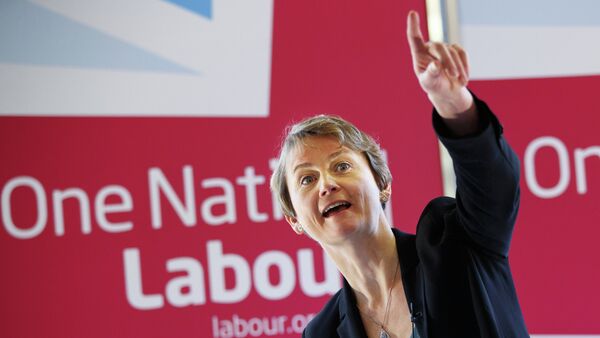Her comments were sparked by a report from John Vine, Independent Chief Inspector of Borders and Immigration that said "no attempts" were made to check overseas criminal records and there were "virtually no other checks" to establish the good character of applicants apart from automated police and immigration tests.
The move for Labour to adopt a tougher stance on immigration could be viewed as an attempt to not be left behind on the issue that has dominated back and forths between UKIP and the Conservative Party.
Yvette Cooper has distanced herself from this notion but did criticise current Home Secretary Theresa May's handling of immigration policy. She said: "Basic checks are just not being done and that is undermining confidence in the whole system. The number of people stopped and turned away at the border has halved."
Counterterrorism Bill 2.0
It is timely then that the UK Counterterrorism and Security Bill has returned once more to Parliament fronted by Yvette Cooper's opposite number, Theresa May. Whilst not applying to general immigration policy the bill in its new incantation allows for far-reaching measures that could curb free movement, family life, free expression, and risks alienating specific communities. “The UK government is rushing to adopt some of the most problematic changes to counterterrorism policy in years,” said Izza Leghtas, Western Europe researcher at Human Rights Watch. “Parliament should learn the lessons of the past, when it adopted bad counterterrorism laws in haste.”
If adopted, the new bill would:
- Allow police to confiscate passports for extended periods for British citizens and others suspected of planning to leave the UK to engage in terrorism-related activities abroad;
- Allow the government to ban British citizens and residents from returning to the UK for two years, rendering them effectively stateless during that period;
- Reintroduce compulsory, internal relocation in the UK for terrorism suspects not convicted of any crime; and
- Allow the Home Secretary to impose restrictions on universities and schools in the name of preventing extremism in ways that could impair free expression.
Disproportionate Laws
The bill comes in a context of growing concern over Western citizens travelling to Syria and Iraq to join armed groups such as the extremist group Islamic State (also known as ISIL), to which Western governments have responded with problematic and disproportionate counterterrorism laws, with the aim of preventing citizens from joining these groups and blocking their return if they do.
In 2010, Home Secretary Theresa May promised that the new government would strike a better balance between liberty and security. The government has taken steps to revise some problematic counterterrorism measures adopted by the previous government, such as police search powers and control orders. This new bill seems to completely contradict that notion and it has been heavily criticised for proposing significant breaches of UK citizens’ civil liberties.
The independent reviewer of terrorism legislation, David Anderson QC, appointed by the UK government, said: “The concern I have about this power and the central concern about it is: where are the courts in all of this?
“One could look at it in terms of young, possibly vulnerable people caught up with the wrong crowd in Syria – didn't really know exactly what they were doing.
“Do you want to throw the book at them straight away in terms of arrest and charge? Or is there something to be said, even though you do suspect them of having fought, for keeping them under a very light regime where they might have to report daily to a police station?
“They might have to notify [of] their residence; they might have to go along to meetings with probation or with some similar which perhaps might be for some people be a more sensible way of dealing with them than putting them straight into the criminal justice process."
Fully Independent Mechanism Required
Izza Leghtas also said: “Governments around the world often cite UK laws and policies as examples. This bill sends the dangerous message that stripping people of their rights based on mere suspicion is acceptable in the name of security.”
According to Human Rights Watch, one positive element in the bill is a proposal to create a Privacy and Civil Liberties Board to assist the Independent Reviewer of Terrorism Legislation in reviewing the impact of UK counterterrorism legislation. In order to be effective, such a mechanism should be fully independent from the government and its agencies, not report to any other authority, and include experts in human rights law.
It should have sufficient funding and resources and access to the classified information it needs to carry out its mandate. It should also have the power to refer any abuses it uncovers to the authorities, HRW believes.




